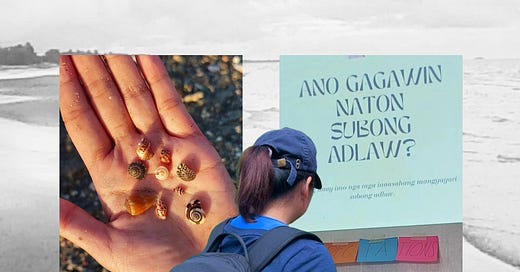The what, how, and why of sustainability work
My friend's thoughts as a fisherfolk community organizer in Roxas, Capiz
For this special issue, I talked to my dear friend Ricci Tagle, a Capiz-based fisherfolk community organizer working for SIKAT Inc. I’ve always admired how dedicated she is to her advocacy of sustainability. Her career path, just like herself, is far from ordinary.
So what do you do, exactly?
If I had to sum it up short and sweet: I work with fisherfolk communities to help them conserve and sustainably manage their fisheries.
Unlike most sustainability careers, my work isn’t just limited to scientific data collection, since the job is more than that and I am neither a marine scientist nor a fisheries major (it’s definitely a bonus if you are, of course). Community organizing is more about capacitating and empowering communities. It means you engage more with stakeholders rather than just the environment and the data.
I get that that sounds vague, but to give you a quick and easy explanation, I design and execute projects and activity plans that help communities learn how they can sustainably manage their coastal resources, whether that be managing crabs, saving mangroves, or regulating fishing gears. So that means the job is very multidisciplinary, because you’re not just a data analyst, you’re a communications officer, a project head, and in charge of external relations.
How did you come to work for SIKAT?
I’ve been with SIKAT for over a year now. I met them while I was doing my undergraduate thesis on fisheries in 2023 - I ended up doing onsite work for three months in Roxas, Capiz. There, I got to interview over 60 people across 20 barangays along the coast of District 1.
SIKAT helped introduce me to local communities affected by illegal fishing, climate change, and mangrove deforestation, and at the same time, taught me what it means to engage the community in these problems.
I will never forget those months. Nothing will ever compare. The fisherfolk all taught me their language, shared their home with me, and more importantly showed me how to dream for a better ocean despite all the odds.
After I submitted my thesis, I graduated, received a call again from SIKAT - they offered me work as a community organizer. At this point in time, I felt like I was growing out of Manila and wanted to be in touch with a world different from the one I've always known. I relocated to Roxas.
What's the most memorable experience you've had working for SIKAT?
My most memorable experience as a student and community organizer was seeing fisherfolk, the Barangay, Municipal, and Provincial LGU, NGO, and local volunteers work together. I've read about “participatory” and “inclusive” stakeholder processes, but never understood it as well as I did when I finally saw it in action.
The whole thing feels so rewarding. By taking the road less traveled, I have been privy to accomplishing almost all my childhood dreams. These experiences expanded my horizons and showed me what I am capable of.
What's one thing most people don't know about NGO work?
Immersing with the community has made the more overwhelming parts of the job worth it. NGO work can be highly informal, from its organizational structure, professionalism, and funding. The career path isn't as clear cut as you would have it in commercial industries, and you do have to review what exactly your boundaries are in light of so many compromises. So you need to have a strong “why” to get through what you do when you’re a community organizer.
What motivates you to do community organizing?
It’s given me a home I can run to in the absence of one. I am moved by how welcoming fisherfolk have been to me despite our differences and language barriers. My family life is complicated, and I've spent most of my childhood without many holidays or birthdays, but every community has made up for every single one missed and has blessed me with the experience of what it's actually like to be part of a family.
What are the most important things you’ve learned from your work?
Don’t ever get too comfortable. So much is lost by staying in the comfort zone.
You’ll see many people come together, but rarely see them stay together.
There’s always someone out there who will understand.
What's your advice for people who want to do something similar?
If you're someone who refuses to believe the world is hopeless, or just someone in search of another side to life, then by all means, contact me.
Update 02/18/25: Ricci’s since co-founded an initiative partnering with Capiz fisherfolk. The initiative is called Bangon Baybay. One of their first projects is building wooden fences - an alternative to sea walls. They’ve got more planned, so please give them your support!





